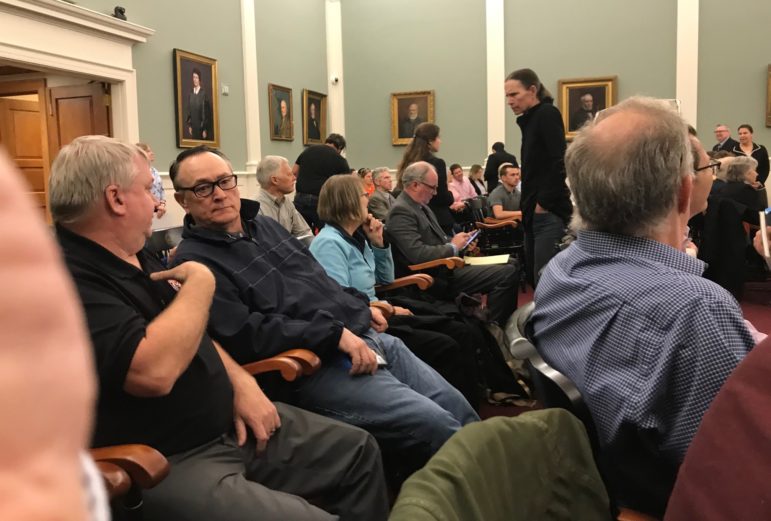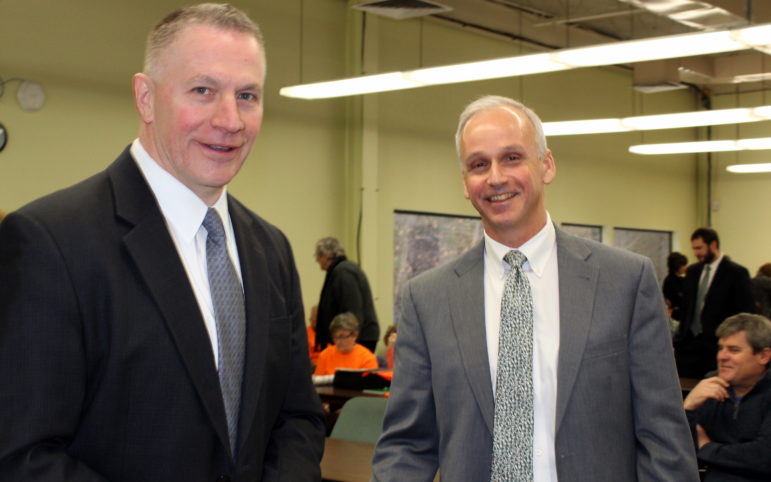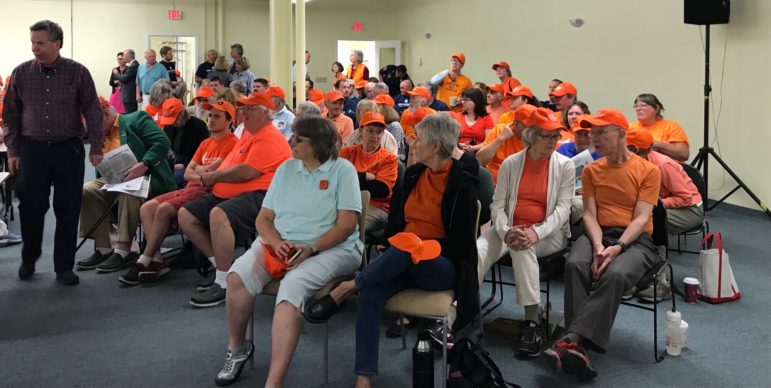
By GARRY RAYNO, InDepthNH.org
CONCORD – Oral arguments on the Northern Pass Transmission project before the Supreme Court last week was like a dysfunctional family reunion.
Lawyers from all sides shook hands, talked and joked as did intervenors and advocates pro and con, and observers before the justices took their seats.
With the exception of the justices, most people in the room spent the spring, summer, fall and into winter of 2017 in the building at the end of Donovan Street in Concord where 70 adjudicative hearings were held before the Site Evaluation Committee.
There were people from the North Country, the White Mountains, the not-so-far north country as well as the Concord area down to Deerfield.

With attorneys representing towns and cities, organizations like the Society for the Protection of New Hampshire Forests and the Counsel for the Public, as well as Eversource, who wouldn’t be reminded that the billable hours during those hearings were astronomical.
The developer’s attorney, Wilber Glahn, reiterated what Eversource has maintained since the Site Evaluation Committee turned down the project in February 2018 setting in motion a series of requests and responses that brought everyone together at the New Hampshire Supreme Court on Wednesday.
Glahn argued the SEC should have continued deliberations after finding developers failed to meet the second of four criteria needed to grant a permit, and if they had he maintained the benefits of the $1.6 billion, 192-mile, 1,090 megawatt transmission line to transport Hydro-Quebec electricity to Massachusetts would have been obvious and would outweigh all the adverse impacts.
And Glahn argued regulators failed to follow statutes and their own rules in turning down the project, while the Counsel for the Public and lawyers for intervenors opposed to the project argued the SEC got it right and the decision should stand.
The lawyers were repeatedly questioned by the five justices with some questions coming before the attorneys had barely begun their presentations. It was a more subdued and cerebral battle than the ones at the end of Donovan Street and much shorter.
The lengthy battles between supporters and opponents in quasi courtroom settings over transmission lines have moved from the Granite State to the Pine Tree State where Central Maine Power is embroiled in a pitched dispute with opponents over construction of a $1 billion, 145-mile corridor through Western Maine to bring that same Hydro-Quebec electricity to Massachusetts.
While Wednesday at the Supreme Court may have been like a family reunion, it also was a reminder of how much the electric industry has changed since the project was first proposed in 2010 and since the SEC turned down the application a little over a year ago.
When it was proposed, importing hydro generated energy was a slam dunk financially due to the soaring costs of natural gas used to generate the majority of New England’s electricity. States were beginning to set modest renewable energy goals and the Regional Greenhouse Gas Initiative (RGGI) was still new.
Soon however, fracking dropped the price of natural gas significantly, along with electric rates, and states began increasing their renewable energy goals to combat global warming and lingering air pollution.
Federal subsidies made wind farms tax havens for foreign energy companies and Hydro-Quebec was working on a new project to produce more renewable electricity hoping to sell it to the Northeast to quench its thirst for clean energy.
Other transmission lines were proposed to bring Canadian hydro-power south with the 1,200-megawatt clean energy Massachusetts contract the prize for the winner.
Along with New Hampshire and Maine, Hydro-Quebec power was the driver behind a TDI-New England project running cable under Lake Champlain connecting to the New England grid in Ludlow, Vermont.
New England Clean Power Connect has all its needed permits but has yet to begin construction. TDI-New England is a wholly-owned subsidiary of Blackstone, one of the world’s largest financial and investment firms.
If easy money were to be made importing Canadian hydro-power, construction of New England Clean Power Connect would have begun long ago.
Another line was proposed in existing utility corridors along the Connecticut River in Vermont, through New Hampshire and into the Boston energy pool backed by National Grid and others but has all but disappeared today.

Ironically, New England and other Northeastern states have upped their goals for renewable and clean power use, which, you would think, would accelerate interest in large-scale, hydro-power from the north.
While there is still interest in the 2,000 megawatts or more of available Hydro-Quebec electricity, there is growing interest in large-scale municipal and institutional solar projects and large, off-shore wind farms.
Lawmakers have made it more economically feasible to generate your own — not grow your own — electricity with advances in net metering programs and increasing the amount of self-generated electricity someone may use to offset utility power needed when the sun doesn’t shine or the wind doesn’t blow.
Locally generated electricity or what is called distributed energy is growing in popularity as the hardware prices come down and the payback is shortened.
Micro grids and advances in battery storage continue the push and are the next explosion about to happen in the electric industry.
The kinks and regulations are being discussed by lawmakers, utility commissions, utilities and generators and some see a solution in the next few years that will make another significant change in the electric utility industry.
The push, however, is not universal: some sectors like the Business and Industry Association in New Hampshire are not convinced the cutting-edge technology will not drive up costs for their members.
But that does not stop the innovators from thinking outside the box envisioning a brave new world of energy generation, transmission, storage, efficiency and usage.

In the distant past, everyone believed every home would have its own little nuclear plant to provide the electricity needed to be self-sufficient and charge cars that flew.
Obviously, that is not where the electric industry is going today, but it is going local.
The question remains, in a place like New England with its often-dreary weather with days on end without sun — like the last two months — and widely varying winds, can local generation produce enough electricity to power a home or a community economically?
The need for a reliable or “base source” will always be there but will the need for large, high-voltage transmission lines?
From Northern Pass’s public inception to last week’s oral arguments before the Supreme Court has been a decade and tens of millions of dollars of expenses for the company.
Is it worth going through that again? Only Eversource and Hydro-Quebec can answer that, but thousands of folks along the proposed route want the company to know the answer should be “No.”
And they reminded everyone of that as they stood outside the Supreme Court last week holding their signs.
Garry Rayno may be reached at garry.rayno@yahoo.com
Distant Dome by veteran journalist Garry Rayno explores a broader perspective on the State House and state happenings for InDepthNH.org. Over his three-decade career, Rayno covered the NH State House for the New Hampshire Union Leader and Foster’s Daily Democrat. During his career, his coverage spanned the news spectrum, from local planning, school and select boards, to national issues such as electric industry deregulation and Presidential primaries. Rayno lives with his wife Carolyn in New London. InDepthNH.org is New Hampshire’s only nonprofit, online news outlet dedicated to holding government accountable and giving voice to marginalized people, places and ideas.





